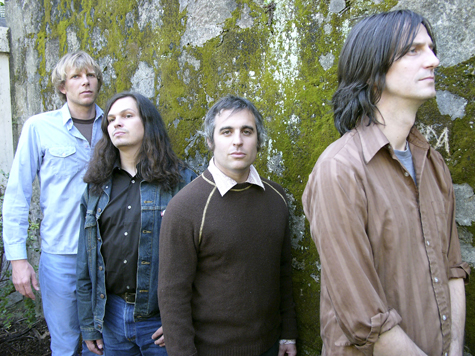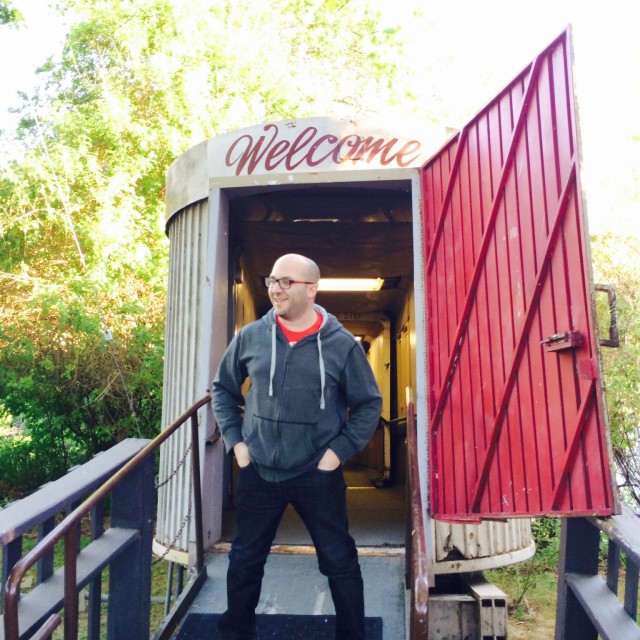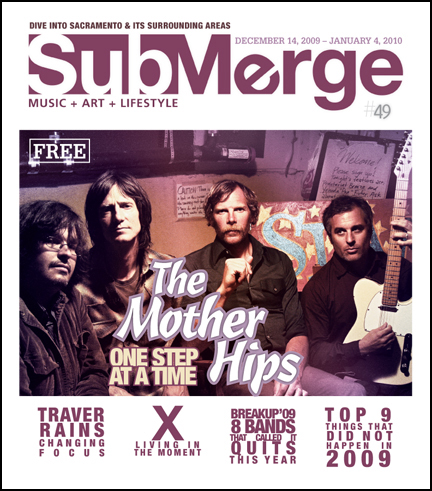
The Mother Hips Settle into a steady groove on their latest album
The rumors of The Mother Hips’ demise have been greatly exaggerated—and for quite some time now. In 2003, the venerable San Francisco-based psychedelic-tinged rock band went on a hiatus that lasted a year. But to hear people talk about it, you’d think they were gone for decades.
“There’s a common misconception that we took a bunch of time off, but it wasn’t really that long,” says The Mother Hips’ co-founder and co-songwriter Tim Blum. “We actually only skipped 75 shows that we would have normally played, but we’re definitely on a roll right now.”
Bluhm says the band decided to take a break due to its members’ frustration over touring, and also to “see what else was out there in life, and we wanted to see what would happen if we weren’t playing with the Mother Hips,” Bluhm says.
But like Bluhm says, The Mother Hips’ hiatus is a distant memory. In late October, the group released its second post-break studio album, Pacific Dust, on New York City-based indie label Camera Records. Bluhm credits the band’s productivity in part to the environs in which Pacific Dust was recorded; the band laid down the tracks for the album at Bluhm’s Mission Bells studio in San Francisco.
“The record went beautifully,” Bluhm says of recording Pacific Dust. “Owning a studio is a big part of that. Just having a studio with all the guys in the band feels really comfortable. They’ve been in there a lot, playing on other records that I’ve produced over the past three years. I always call on them to play parts on other people’s records, so all of the guys have spent a lot of time recording there”¦ It’s a dream come true.”
Bluhm also gives a big nod to the band’s current label for its support. The Mother Hips have had difficulty with record labels in the past, and these experiences are documented in seething detail on the fuzzed-out, bluesy rocker “Third Floor Story” from Pacific Dust. However, things are different at Camera Records. In fact, if it wasn’t for the label, The Mother Hips may not have decided to end their hiatus at all. Bluhm explains that when The Mother Hips took their break, there wasn’t a grand scheme involved.
“We didn’t know what was going to happen really,” Bluhm says. “We didn’t have an agreement. We decided that we needed some time off. We were just taking one step at a time, and we weren’t thinking about the future. The first six months that we got back together, it was just touch and go. We were just doing them one at a time and see how it went.”
It was Bluhm’s correspondence with Camera Records’ owner Jon Salter that got the ball rolling for the The Mother Hips’ reformation.
“To have those guys on our team is the best things we got going for us right now,” Bluhm says of the small label. “Their enthusiasm and their passion have a lot to do with why we stopped our hiatus and started playing again.
“We always talked about how there had to be some way [Salter] could help us out with our advancement,” he continues. “And he finally figured out that the best way to do that was to start a record label of his own.”
Submerge spoke with Bluhm from his Bay Area home, just “100 yards from the ocean,” before he was to indulge in a feast of fresh-caught Dungeness crab.
I saw on your Twitter account that you’ve been doing some crabbing recently. Is that a regular hobby of yours?
It hasn’t been. I’ve always enjoyed a little bit of abalone diving, and I’ve always enjoyed eating seafood. My buddy has a little boat that we take out to access surfing spots that you can’t walk into or drive into. He recently got some traps, and so we’ve been going out and getting crabs out in the Bay Area. This morning was really lucrative. Today, we woke up super early and found them, and we limited out. We got 20 large crabs.
Crab is my favorite seafood, I think.
Well it’s too bad we’re not doing this interview in person, because you could hang out afterwards and join us. We certainly have enough.
Thank you! How are you serving them?
We boiled them as soon as we caught them. They were all cooked by 11 this morning, and now they’re chilling in the fridge. We’re doing Vietnamese garlic noodles and crusty French bread and that’s it. Melted butter doesn’t even seem necessary if they’re really fresh like that, and they’re big and they’re sweet. Sometimes butter is really good, but it’s not really necessary.
Pacific Dust was recorded in your studio, but did you produce the album also?
I didn’t. The band produced it along with David Simon-Baker, who’s my studio partner and an extremely talented guy. We usually do stuff together, but on this project, since it was my band, it wasn’t appropriate for me to play the role of the producer. I wanted it to be like all the other records, where everyone [in The Mother Hips] is on a level playing field.
Why do you think it’s important to keep yourself separated from that process?
I’m not really sure. I’ve produced enough records to see that if”¦ I don’t know. It’s different. If you produce it yourself, then it isn’t really a producer. I think a producer has to be separate from the material, because otherwise”¦ It can still work fine, but I think a large part of the producer’s role is to have an objective perspective. It’s very difficult to produce yourself, because that’s sort of an oxymoron.
In a couple years, you’ll be looking at your 20th anniversary. Has the chemistry between you and Greg [Loiacono, guitarist], changed a lot over
the years?
It really hasn’t changed that much, interestingly enough. I think that the relationship between Greg’s songwriting and my songwriting has always stayed somewhat the same. We both write songs; we don’t collaborate that often, but we certainly help each other with songs and we always bounce ideas off of each other and value each other’s opinions. But it’s the same as it’s always been. Greg’s been getting more and more songs on the record as the records have progressed, but I’ve always written more songs that show up on the record than he has. That’s the way it started, and that’s the way it still is, but he’s stepped up more on the last few records, and I think that’s a good thing.
Do you think having two primary songwriters in a group intensifies the need for an outside person to be a producer?
I think it does. Typically, The Mother Hips have had producers here and there, but we’ve done a lot of the recording without a producer, but I think in the future, we’ve seen that having someone who can act as a producer is really important to the quality of the record. What David Simon-Baker brought to this project was a strong outside opinion—among a lot of other things. I think this record is better, because we listened to someone else who had a strong opinion and a really strong talent for understanding other people’s music. We haven’t really worked with producers much, but I think we should.
I wanted to talk about the title track from the album. I was wondering why you chose that song as the title track, or if you’d just had the title in mind already and then assigned the title to that song.
Yes, it was more like that than the other way around. The title had been kicking around for a while. I came up with it years ago, and I just liked it. Actually, my first studio was called Pacific Dust, when I first started recording stuff, and I always liked it. But when I switched spaces and I got partners, the name got lost, and I always wanted to bring it back. The record label suggested that we call the record Pacific Dust, and we just chewed on that for a while, and it just seemed appropriate. When I came up with the words for the title track, the song that became “Pacific Dust,” it just worked really well for the vibe that song has.
It seemed to be one of the more psychedelic tracks on the album, both musically and lyrically. Could you talk about the vibe of that song for a bit?
It’s definitely psychedelic. It was a song that wasn’t a song at all. We kind of came up with a couple of these riffs, and during sound checks over the last couple of years, we kind of messed around with that main chorus riff a couple of times, and it was really fun to play. It was really powerful, and we really liked it. We were in the recording sessions, and we ended up playing it. There were no words. It wasn’t really a song, we just put it down, and that’s what it came out as. It was definitely psychedelic, because we didn’t have a form, and it was very improvisational. But it sounded really good, so I decided I’d try to write some lyrics for it, and I just sang whatever came off the top of my head and kind of carved it out.
Is that indicative of how you like to work?
No. It’s actually the opposite of our typical way of working, but it was really cool, and it inspired us to do more stuff like that.
You’ve been a San Francisco-based band for a while now, but you started out up in Chico. Do you still consider yourself a Chico band in a way?
You know, Chico is my alma mater, and I spent a lot of my formative years there and I loved it, but I don’t feel like we’re a Chico band anymore. Maybe that’s the wrong answer, but Greg and I still love playing up there. We had a lot of good times up in Chico, but we had a lot of bad times up in Chico too. We were going through a hard time in our lives in Chico toward the end. It’s bittersweet when we go up there. It’s a beautiful town. Anyone who’s lived up there knows that. It just seems that things are cheaper and quieter, but honestly, my history with it keeps me away. As fond as my memories are of Chico, I also have some reasons to keep that chapter of my life in the past.
The Mother Hips played a New Year’s Eve [Dec 31, 2009] show at Marilyn’s on K.



Comments